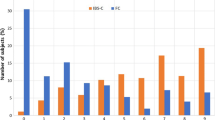Abstract
The diagnosis of irritable bowel syndrome requires the exclusion of any associated organic disease: a positive diagnosis would avoid expensive and potentially dangerous diagnostic procedures. A scoring system has been proposed for positive diagnosis where more than 44 points excluded organic digestive disease. The aim of this study was to determine the usefulness of this scoring system in a different setting. Patients (1257) consecutively referred to our medical division were admitted to the study and 270 of these, complaining of abdominal symptoms, were scored on the Kruis system method. The positive predictive value (53.8% for men and 81.5% for women) and the sensitivity (46.7% and 59.5%) did not appear to be adequate. The negative predictive value (91.6% and 87.3%) and the specificity (93.5 and 95.4%) gave higher results, but two cases of neoplasia and nine cases of other organic digestive diseases were not identified or suggested. We believe that this scoring system may be useful only as a first step in a diagnostic flow chart.
Similar content being viewed by others
References
Kruis W, Thieme CH, Wienzierl M, Schussler, Holl J, Paulus W: A Diagnostic Score for the irritable bowel syndrome. Its value in the exclusion of organic disease. Gastroenterology 87:1–7, 1984
Manning AP, Thompson WG, Heaton KW, Morris AF: Toward a positive diagnosis of the irritable bowel. Br Med J 2:653–654, 1978
Wasson JH, Sox HC, Neff RK, et al: Clinical prediction rules. Applications and methodological standard. N Engl J Med 313:793–799, 1985
Mantel N: Why stepdown procedures in variable selection. Technometrics 12:621–625, 1970
Talley NJ, Phillips SF, Melton LJ, Mulvihill C, Wiltgen C, Zinstmeister AR: Diagnostic value of the Manning criteria in irritable bowel syndrome. Gut 31:77–81, 1990
Author information
Authors and Affiliations
Rights and permissions
About this article
Cite this article
Frigerio, G., Beretta, A., Orsenigo, G. et al. Irritable bowel syndrome. Digest Dis Sci 37, 164–167 (1992). https://doi.org/10.1007/BF01308166
Received:
Revised:
Accepted:
Issue Date:
DOI: https://doi.org/10.1007/BF01308166




